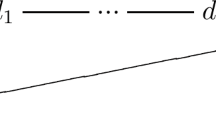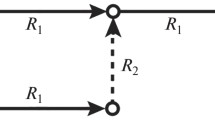Abstract
We continue work of our earlier paper (Lewitzka and Brunner in Log Univers 3(2):219–241, 2009) where abstract logics and particularly intuitionistic abstract logics are studied. Abstract logics can be topologized in a direct and natural way. This facilitates a topological study of classes of concrete logics whenever they are given in abstract form. Moreover, such a direct topological approach avoids the often complex algebraic and lattice-theoretic machinery usually applied to represent logics. Motivated by that point of view, we define in this paper the category of intuitionistic abstract logics with stable logic maps as morphisms, and the category of implicative spectral spaces with spectral maps as morphisms. We show the equivalence of these categories and conclude that the larger categories of distributive abstract logics and distributive sober spaces are equivalent, too.
Similar content being viewed by others
References
Bezhanishvili, G., Bezhanishvili, N., Gabelaia, D., Kurz, A.: Bitopological duality for distributive lattices and Heyting algebras. Math. Struct. Comput. Sci. 20, 359–393 (2010)
Bezhanishvili, G., Mines, R., Morandi, P.J.: Topo-canonical completions of closure algebras and Heyting algebras. Algebra Univers. 58, 1–34 (2008)
Bloom, S.L., Brown, D.J.: Classical abstract logics. Diss. Math. 102, 43–51 (1973)
Blok, W., Pigozzi, D.: Algebraizable logics, vol. 396. Memoirs of the American Mathematical Society, Providence (1989)
Brown, D.J., Suszko, R.: Abstract logics. Diss. Math. 102, 9–42 (1973)
Brunner, A.B.M., Lewitzka, S.: Topological Representation of Intuitionistic and Abstract Logics, Abstract Published in XVI. Encontro Brasileiro de Lógica, Petrópolis, Rio de Janeiro (2011)
Caleiro, C., Gonçalves, R.: Equipollent logical systems. In: Beziau, J.Y. (ed.) Logica Universalis: Towards a General Theory of Logic, 2nd edn. Birkhaeuser Verlag, Basel (2007)
Davey, B.A., Priestley, H.A.: Introduction to Lattices and Order, 2nd edn. Cambridge University Press, Cambridge (2002)
Eiben, Á.E., Janossy, A., Kurucz, Á.: Combining algebraizable logics. Notre Dame J. Form Log 37(2), 366–380 (1996)
Fiorentini, C.: Kripke completeness for intermediate logics. PhD. Thesis (2000)
Fitting, M.: Intuitionistic logic, model theory and forcing. North Holland, Amsterdam (1969)
Font, J.M., Verdú, V.: A first approach to abstract modal logics. J. Symb. Log. 54, 1042–1062 (1989)
Goguen, J.A., Burstall, R.M.: Introducing institutions. Lecture Notes in Computer Science, vol. 164, pp. 221–256 (1984)
Hochster, M.: Prime ideal structure in commutative rings. Trans. AMS 142, 43–60 (1969)
Jansana, R.: Propositional consequence relations and algebraic logic. In: Zalta, E.N. (ed.) The Stanford Encyclopedia of Philosophy, Spring 2011 edn. http://plato.stanford.edu/archives/spr2011/entries/consequence-algebraic/
Johansson, I.: Der Minimalkalkül, ein reduzierter intuitionistischer formalismus. Compos. Math. 4, 119–136 (1937)
Johnstone, P.T.: Stone Spaces. Cambridge University Press, Cambridge (1982)
Lewitzka, S.: Abstract logics, logic maps and logic homomorphisms. Log. Univers. 1(2), 243–276 (2007)
Lewitzka, S.: \(\in _{4}\): A \(4\)-valued Truth Theory and Metalogic, preprint (2007)
Lewitzka, S., Brunner, A.B.M.: Minimally generated abstract logics. Log. Univers. 3(2), 219–241 (2009)
Mendes, C.A., Mariano, H.L.: Towards a good notion of categories of logics. arXiv:1404.3780v2 (2016)
Miraglia, F.: An Introduction to Partially Ordered Structures and Sheaves, Contemporary Logic Series, vol. 1, Polimetrica International Scientific Publisher, Milan, Italy (2006)
Priestley, H.A.: Representation of distributive lattices by means of ordered Stone spaces. Bull. Lond. Math. Soc. 2, 186–190 (1970)
Rasiowa, H.: An Algebraic Approach to Non-Classical Logic. North-Holland Publ. Co., Amsterdam (1974)
Acknowledgements
We would like to thank the anonymous referee for many helpful comments and suggestions improving this work. The first author would like to thank the support from MaToMUVI Project with Number 247584 and the hospitality of University of Salerno (UNISA), where a part of this work was finished in the fall of 2014. The second author thanks the hospitality of the University of Potsdam, where part of this work was finished in the fall of 2016.
Author information
Authors and Affiliations
Corresponding author
Rights and permissions
About this article
Cite this article
Brunner, A.B.M., Lewitzka, S. Topological Representation of Intuitionistic and Distributive Abstract Logics. Log. Univers. 11, 153–175 (2017). https://doi.org/10.1007/s11787-017-0166-3
Received:
Accepted:
Published:
Issue Date:
DOI: https://doi.org/10.1007/s11787-017-0166-3




